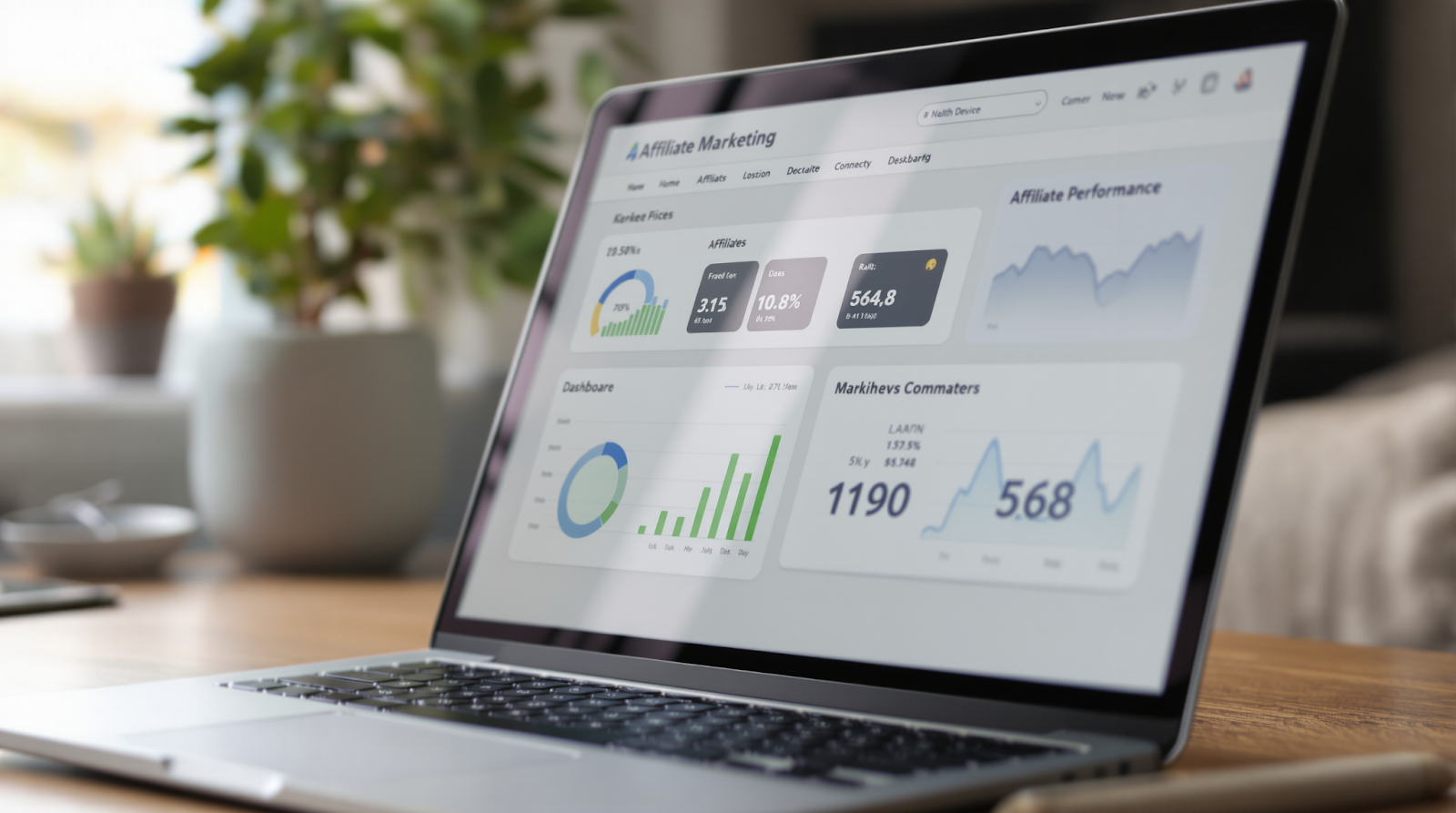At this point, we know influencer marketing is a successful strategy for brands, and it’s here to stay. Affiliate marketing has been around for decades and continues to be successful for brands of all sizes. More than 80% of brands have reported running affiliate marketing programs, according to Findstack. So, what if you combined these two powerhouses? In this guide, we’re going to explore the role influencers can play in contributing to your brand’s affiliate marketing programs, and tips you can implement to ensure your affiliate marketing works effectively.
What Is Influencer Affiliate Marketing?
Influencer affiliate marketing is when influencers share links or codes to buy a company’s products or services, and then earn money based on how many people click on that link or use the code to make a purchase. Influencers who participate in affiliate marketing programs typically only get paid for customers they bring in, which is monitored through various methods like trackable links, promo codes, or landing pages. Influencers who don’t participate in affiliate programs typically get compensated through other means — like a flat fee per sponsored post or video ad, free products or services, or travel cost reimbursement — as they promote the company.

Reasons To Use Influencers in Your Affiliate Marketing Program
Since 2015, spending on affiliate marketing programs has grown by 10% annually and revenue has increased 52%, according to TrueList. Partnering with influencers on affiliate marketing campaigns is a relatively low-risk way to increase sales and decrease costs for brands, especially because influencer campaigns have strong return on investment (ROI). Here’s a snapshot of the specific benefits of influencer affiliate marketing:
Access to New Marketing and Promotion Channel
One reason to include an influencer in your next affiliate marketing program is they can help your brand tap into a new marketing or promotion channel where you’re not yet successful on but know you have an audience. If you’re targeting Gen Z and you haven’t had the expertise or staff to expand marketing efforts to TikTok, you could find an influencer who is already popular on TikTok and have them work on the affiliate campaign with your brand.
Utilize Their Status and Trust
Successful influencers outperform brands when it comes to building trust with their followers. According to the Digital Marketing Institute, 70% of teens trust influencers more than traditional celebrities. Even more, 40% of millennial subscribers say “their favorite influencer understands them better than their friends. ”There are a few reasons for this. First, most influencers have a specific niche — for example, secondhand fashion Instagram influencers — and hone in on that, so they are seen by their followers as an expert. Additionally, most influencers are everyday people, not celebrities and stars, which makes them feel approachable and relatable to their audience and beyond. Tapping into the credibility of influencers and the trust they have established with their followers can open a door for your brand.
{{cta-banner-images}}
Authenticity Humanizes Your Advertising Strategy
Influencers can also be extremely helpful when it comes to humanizing your brand’s advertising and affiliate marketing strategies. A major goal of influencer partnerships is to make advertising as natural and “real” as possible. Experienced influencers are highly skilled at making a highly technical and thoughtful advertising strategy look like a relatable and unforced window into their life. In fact, many influencers only share products or services they actually use or enjoy, so they can speak genuinely about your company. That said, make sure any influencers you work with properly disclose any affiliate links, ads, or sponsored posts so everyone is transparent and your brand doesn’t run into legal issues.
How To Choose Your Affiliate Program Influencers
Know Your Budget and How To Structure Their Compensation
When building your influencer affiliate program, you should set a ballpark budget and compensation structure before you begin to reach out to influencers. Of course, you will have influencers who want to negotiate, but having a starting point to work from is key. Some ways your brand can structure compensation for affiliate marketing influencers include:
- Linear: In this structure, a brand would pay their affiliate influencer an evenly distributed payout amount based on how far a consumer gets into the purchase journey. This type of payment contract is good for campaigns that generate a fixed amount of revenue.
- Fixed margin: Similar to a linear structure, a fixed margin commission structure is when an influencer affiliate’s payout is set on a fixed percentage (commission rate) of the overall brand’s profit from a specific campaign, regardless of the sale amount from each customer.
- Time-decay: This structure gives credit to the influencer who influenced a purchase conversion closest to the initial event. Basically, one influencer may have initially captured a customer’s attention, but a different influencer who reached the customer right before the point of purchase would receive more credit and earn a larger payment. This can be beneficial for brands that advertise across multiple channels and work with more than one influencer at a time.
- Coupon codes (or promo code): This type of payout structure is very common among fashion, lifestyle, and wellness brands that work with influencers in their affiliate programs. In this model, an influencer is given a unique coupon code that they promote to their followers. Every time a sale is made using a specific influencer’s coupon code, they will get paid a set amount or a commission.
- Shopping cart disqualification: Sometimes, you may want to include a shopping cart disqualification clause in your payment structure. This is when affiliates aren’t paid for a sale if a product was already in a customer’s cart. For example, a customer may already have a cart online and plans to purchase, but before clicking “Pay Now,” they search online for a coupon code. They find the coupon code for an influencer and use it in their purchase. Since the influencer didn’t directly prompt the purchase, you may not want to give them the credit.
If you want to learn more about how much influencer marketing costs, find estimates here.
Understanding the Type of Media Your Customers Love Most (What Converts)
You’ll want to work with influencers who are experienced with the specific type of media that resonates with your customers. Types of media could include images, GIFs, short-form and long-form videos, blogs, and podcasts. Identifying this early will help you choose the right influencers and make potential customers more likely to convert, as well as lead to upselling opportunities. Once you do this, make it a point to understand how each type of media is used on the top social media networks. For example, Instagram mostly features eye-catching images and short videos. So, if your customers are drawn to those types of media, you can start to look for Instagram influencers. This strategy can help to narrow down the huge — sometimes overwhelming — pool of influencers. After identifying a type of media and marketing platform, you can begin to evaluate influencers based on how they fit in with your brand’s tone, style, and niche.
Partner With an Influencer Who Already Lives On Your Customers’ Favorite Channels
To avoid starting from square one with each new influencer affiliate campaign, look for influencers who have a robust following on the platforms your customers flock to. For example, if you’re targeting customers over the age of 40, TikTok influencers may not be as successful for your brand as influencers who are more popular on Facebook or Instagram. You can draw on market research or customer personas you already have to decide which channel to target. Some ways to make your search easier is to research certain hashtags related to your brand or niche industry. You can also use geotags in a similar way to find influencers in specific regions, cities, etc. It’s possible to get even more granular with geotags. For instance, if you know your target customer base hangs out at a certain type of business, you can look for influencers who have tagged themselves at those types of businesses.
{{cta-banner-simple}}
Getting Your Favorite Influencers To Say Yes to Your Affiliate Program Offer
Approach Micro-Influencers for Your Affiliate Program
Every brand would love to work with a huge name in their industry, but that’s not always possible, and sometimes won’t be as successful as working with smaller influencers. Celebrities and mega-influencers also aren’t as likely to be interested in a pay-for-performance model of influencing. Instead, it can be more beneficial to focus on micro-influencers who have 10,000 to 100,000 followers. Micro-influencers can be a great bet for brands because they tend to have more niche target audiences and have built deeper trust with their followers. This is in part because micro-influencers are more involved in managing their platforms themselves, versus larger influencers who may have a whole team managing their accounts. Micro-influencers will always be more attainable, flexible, and less expensive than big celebrities. If you don’t yet have a lot of brand awareness or influencer experience, a micro-influencer could be the perfect place to start your affiliate marketing efforts.
Be Complimentary and Knowledgeable About Their Work
When you’re contacting influencers, understand that any influencer you’re talking to is interviewing your brand just as much as you’re interviewing them. That’s why it’s vital to approach every influencer conversation with some degree of knowledge about their work. Research their social media channels — their posts and followers, who they’re following, movements they’ve involved in — in depth before meeting with them and share what you love about their work. You should also explain how these qualities match your brand’s values.
Express That You’re Detail-Oriented but Not Controlling
There’s a fine line brands need to walk when it comes to directing and managing influencers and their work. Influencers are high-quality content creators that have carefully crafted their online presence over several years. This takes dedication, creativity, and strategy. Because of this, some influencers will have stylistic preferences and personal standards that aren’t up for debate when it comes to promoting their affiliate partners. Your brand has also undoubtedly spent years cultivating your presence in the marketplace, and you’ll come with your own set requirements and goals for the affiliate marketing campaign. Be transparent with your potential affiliates about your standards and expectations for content, including what’s nonnegotiable, while highlighting the creative control they’ll maintain. Emphasize that it’s a collaboration and that you’re willing to work with them to create content they’re proud of but that also aligns with your brand.
Give Free Samples and Product Previews as Perks
If you compensate influencers well and make them feel special with early platform access, product sneak peeks, and free samples, they’ll be more likely to want to work with your brand. This can be an especially good strategy to use around the holidays if you’re an ecommerce brand, because this is when influencers are often releasing gift lists and must-haves for the season.
Tips for Helping Your Influencer Affiliate Marketing Efforts Work
Have a Negotiable Influencer Contract and Brief Ready To Go
Have a detailed influencer marketing contract and campaign brief ready so that you can quickly start negotiations when you find an influencer that seems like a match. This is a good idea for a couple reasons. First, it demonstrates to the influencer that your brand is serious about this partnership and you know what you’re doing. Second, this can help you win an influencer who has competing offers, especially during a busy season. Think about templatizing these documents so they’re even easier to create and send when talks with a potential partner become serious.
{{cta-banner-images}}
Utilize Trackable Links and Coupon Codes
As we mentioned earlier, coupon codes and promo codes can play a huge part in your influencer partnership, and custom links are easy-to-use options too. Both links and promo codes help immensely when it comes to tracking purchases or subscriptions successfully generated by an influencer. Links and promo codes are particularly helpful for cross-platform tracking. It’s likely that influencers you’re working with will be active on a few different platforms. So, being able to share an affiliate link or promo code on all platforms will make tracking and analyzing engagement and performance metrics a breeze.
Give Influencers Necessary Brand Guidelines and Useful Marketing Materials
Once negotiations are done and the contract has been signed, it’s important to promptly share brand guidelines and other marketing materials with the influencer. You can have these resources ready ahead of time in the form of a brand kit. This kit will help influencers understand the do’s and don'ts when it comes to representing your brand and navigating digital advertising. This could include things like your company’s:
- Color palette and hex codes
- Preferred font and size (if you’re working with a blogger or creator that can customize their font)
- Approved ad copy or guidelines
- Words to avoid
- Hashtags to use
- Style preferences for photos
- Product descriptions
- Pricing lists for your products/services
- Press mentions or awards
If there are any very specific or strict brand requirements, let the influencer know upfront. For instance, does your product box have to face forward in all pictures? Can they use dark purple or does it need to be hex #3A027F? With these details, they won’t feel blindsided by a requirement that may limit their creativity or voice.
Take Advantage of Popular Hashtags and Any Tags Your Brand Owns
Another way to ensure your affiliate influencer marketing efforts are working in the best way possible is to utilize trending hashtags or other branded tags. This will help grow your brand’s association with the ideas and trends in the hashtags (#healthy, #holidayhaullive, #degenderfashion) and boost brand awareness at the same time. We recommend starting this process long before working with influencers so you have time to monitor tags and identify the audience and content that’s associated with that tag. You want to make sure a hashtag you’re using isn’t tied to values or brands you don’t truly want to associate with. Once you start your affiliate campaign or program, you can confidently ask your influencer pool to use these hashtags and get some added visibility on the platform.
Create a Shared Calendar Based on a Reasonable Timeline
Lastly, setting clear expectations around partnership length, number of posts or mentions, content scheduling (date, time, etc), and more is a vital aspect of running an affiliate influencer marketing campaign. One common approach is to create a shared calendar that your influencers and team can access whenever they need. An influencer marketing platform like From Popular Pays (that’s us) makes it simple to set due dates, request edits, approve content, and send messages throughout this process. It’s also important to incorporate the advice of the influencer and discuss ways to make the timeline more clear to ensure the influencer can realistically produce quality content within the goal time frame.
Recommended Reading: Discover 10 more influencer marketing best practices!
{{cta-banner-text}}
Connect With Your Industry’s Top Influencers and Bolster Your Affiliate Program
If you’re ready to start working with influencers on your next affiliate marketing campaign, do it seamlessly with From Popular Pays. Our platform will help you find, vet, and communicate with influencers, as well as manage your campaigns and analyze performance in real time. Learn more about our all-in-one platform and try a demo.

















